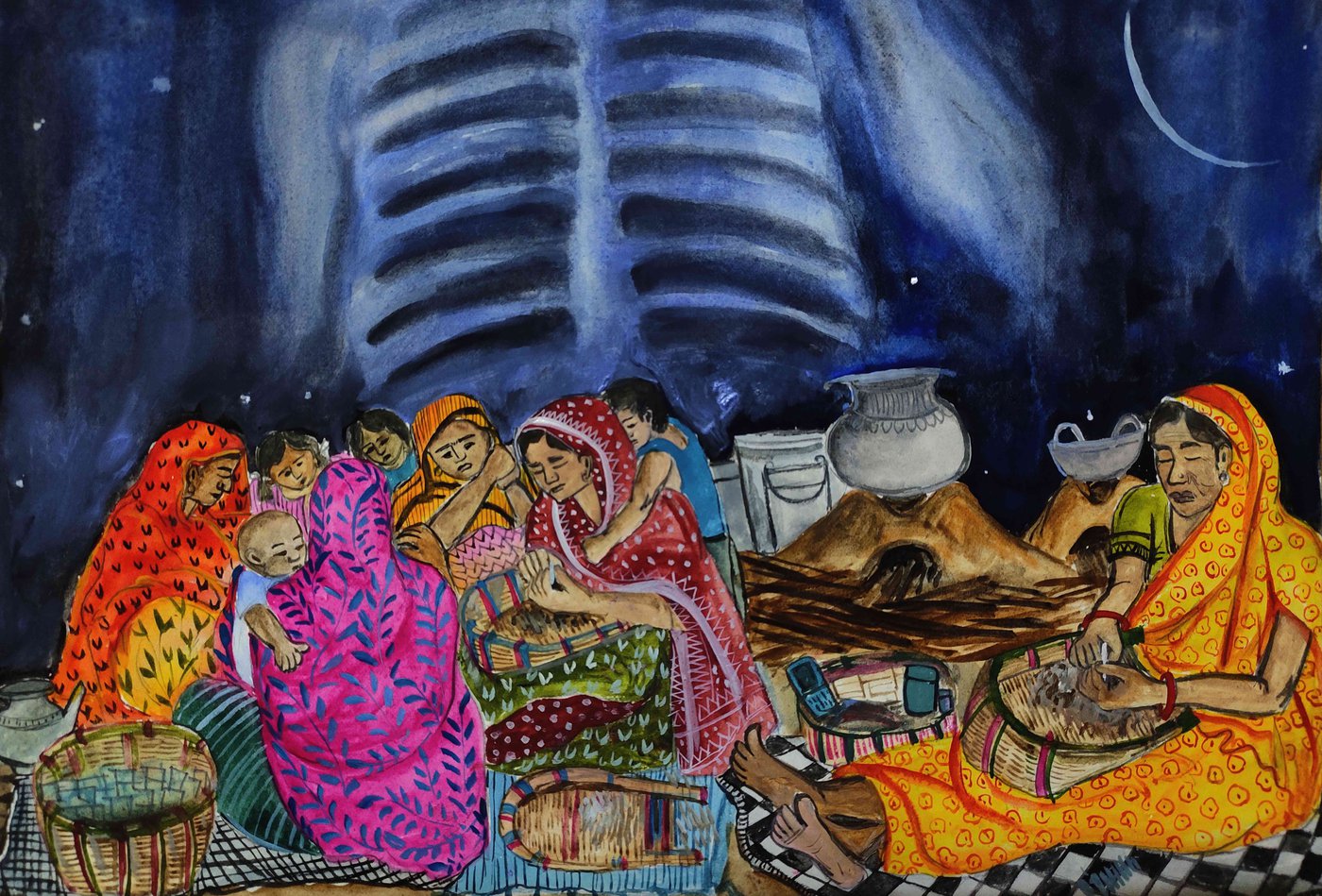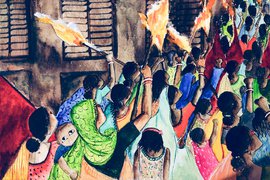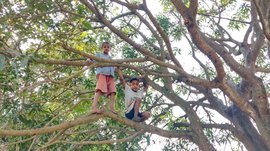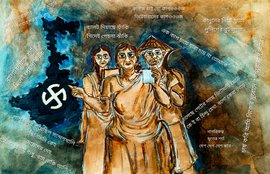When the pain and stiffness in her lower back became unbearable, Tanuja went to see a homoeopath. “He told me I had a calcium and iron problem [deficiency] and I should never sit on the floor.”
A
beedi
worker in West Bengal’s Murshidabad district, she sits for up to eight hours on the floor rolling out
beedis
. “I feel feverish and weak, and have so much pain in my back,” says this worker in her late 40s. “If only I could afford to buy a chair and a table for myself,” she adds.
It’s the end of November and a warm light is falling on the hard cement floor in her home in Hareknagar mohalla . Tanuja is seated on a palm leaf madur (mat) rolling out one beedi after another. Her fingers move deftly as she twists the kendu leaf, elbows locked in position to maintain momentum, shoulders elevated and head dropping to one side. “My fingers are so numb that I wonder if I have them at all,” she says half in jest.
Around her lie the raw materials for making beedis : kendu leaves, tobacco dust and bundles of thread. A tiny sharp knife and a pair of scissors are the tools of her trade.
Tanuja will step out briefly to bring home groceries, do the cooking, fetch water, clean the house and yard and finish other household chores. But all the while she is acutely aware that unless she rolls out her target of roughly 500-700 beedis a day, the monthly income of Rs. 3,000 will shrink.
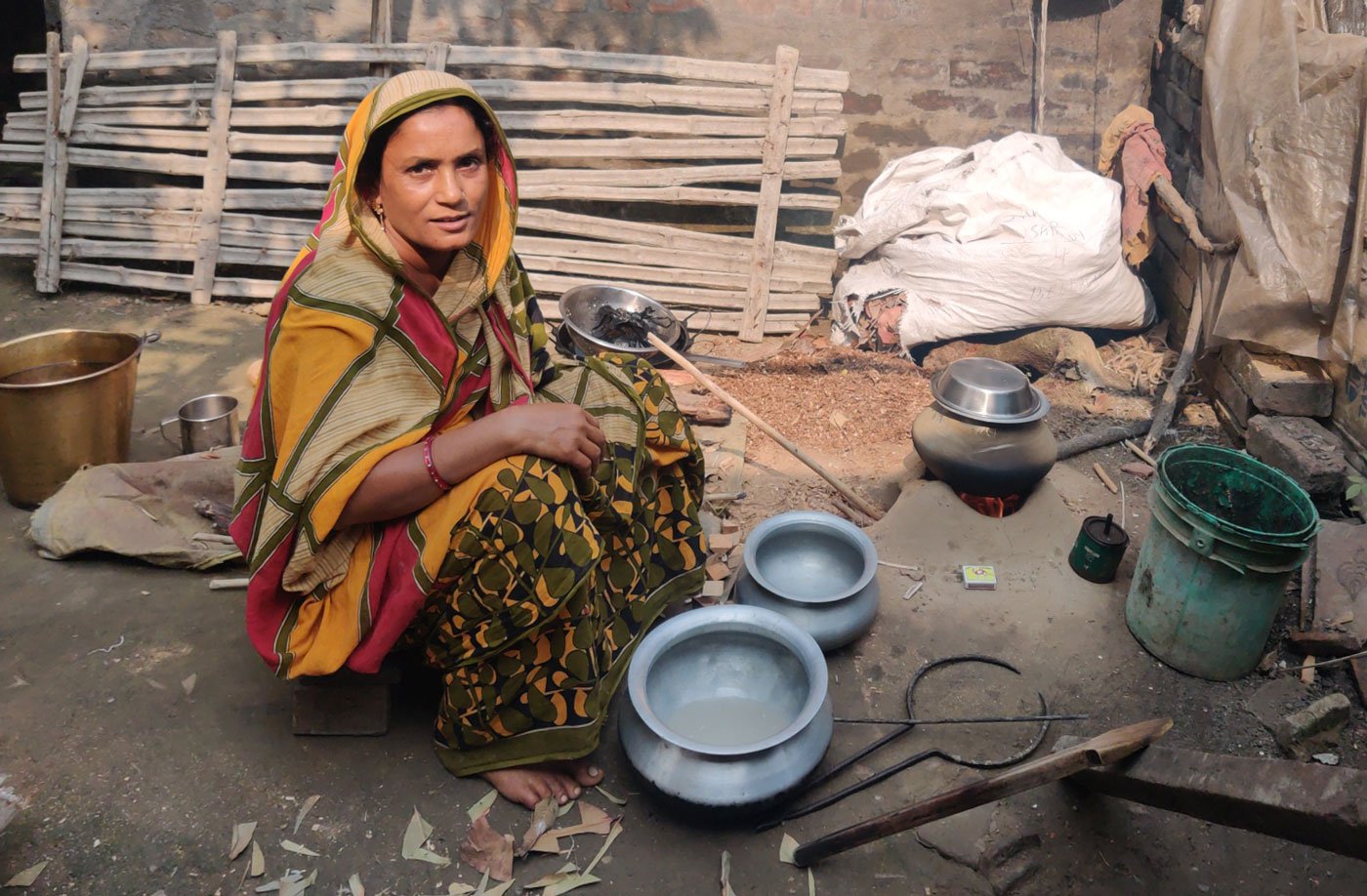
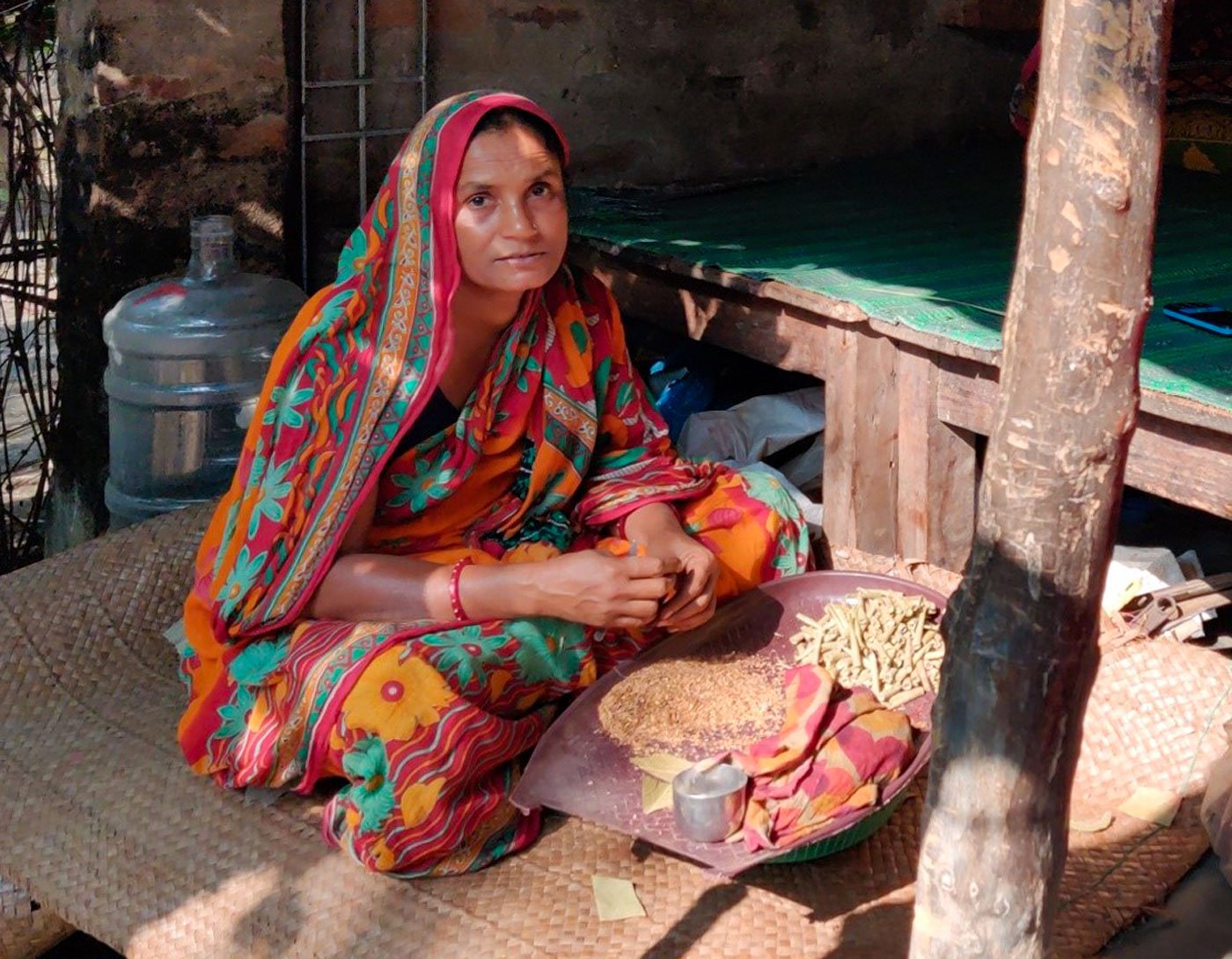
Tanuja Bibi has been rolling beedis since she was a young girl in Beldanga. Even today she spends all her waking hours making beedis while managing her home
So she’s at it from sunrise to midnight. “I wake up when the first azan is announced. After offering the fajr namaz I begin my work,” says Tanuja without taking her eyes off the beedis she is rolling. In fact, her day is measured by the call for namaz as she cannot read the time. Between maghrib (the fourth prayer in the evening) and isha (the fifth and last prayer at night), she cooks dinner and tries to spend at least two more hours rolling or cutting leaves before falling asleep around midnight.
“The only time I get a respite from this bone-breaking work is during namaz. Then I get some rest and peace,” she says. “People say smoking beedis makes one sick. Do they know what happens to those who roll them?” asks Tanuja.
In early 2020 when Tanuja was finally gearing to go see a doctor at the district hospital, lockdown struck and the fear of contracting Covid stopped her. Instead, she went to see a homoeopath. Along with non-registered medical practitioners, they are often the first choice of low-income families of beedi workers here in Beldanga - I block. West Bengal faces a shortage of 578 doctors in primary health centres (PHCs), according to the Rural Health Statistics 2020-21 . There is also a shortfall of 58 per cent PHCs in rural areas. So while visiting a state-run hospital is cheaper, it involves waiting in long queues for follow-up tests and scans. The subsequent loss in daily wages is crippling and as Tanuja says, “We don’t have that kind of time.”
When the homoeopath’s medicines didn’t help, Tanuja collected 300 rupees from her husband, added 300 from her earnings and finally went to see a local allopathic doctor. “He gave me some tablets and asked me to get an X-ray of my chest and a scan. I had to skip that,” she says, making it clear that she could not afford those investigations.
In West Bengal, women workers like Tanuja account for
70 per cent of the 20 lakh
beedi
workers in the state. Their poor working conditions result in posture-related complications like cramps, muscle and nerve pain as well as pulmonary issues and even tuberculosis. They come from low income homes and nutritional deficiencies further compound the work related ailments and impact their overall health and reproductive wellbeing.
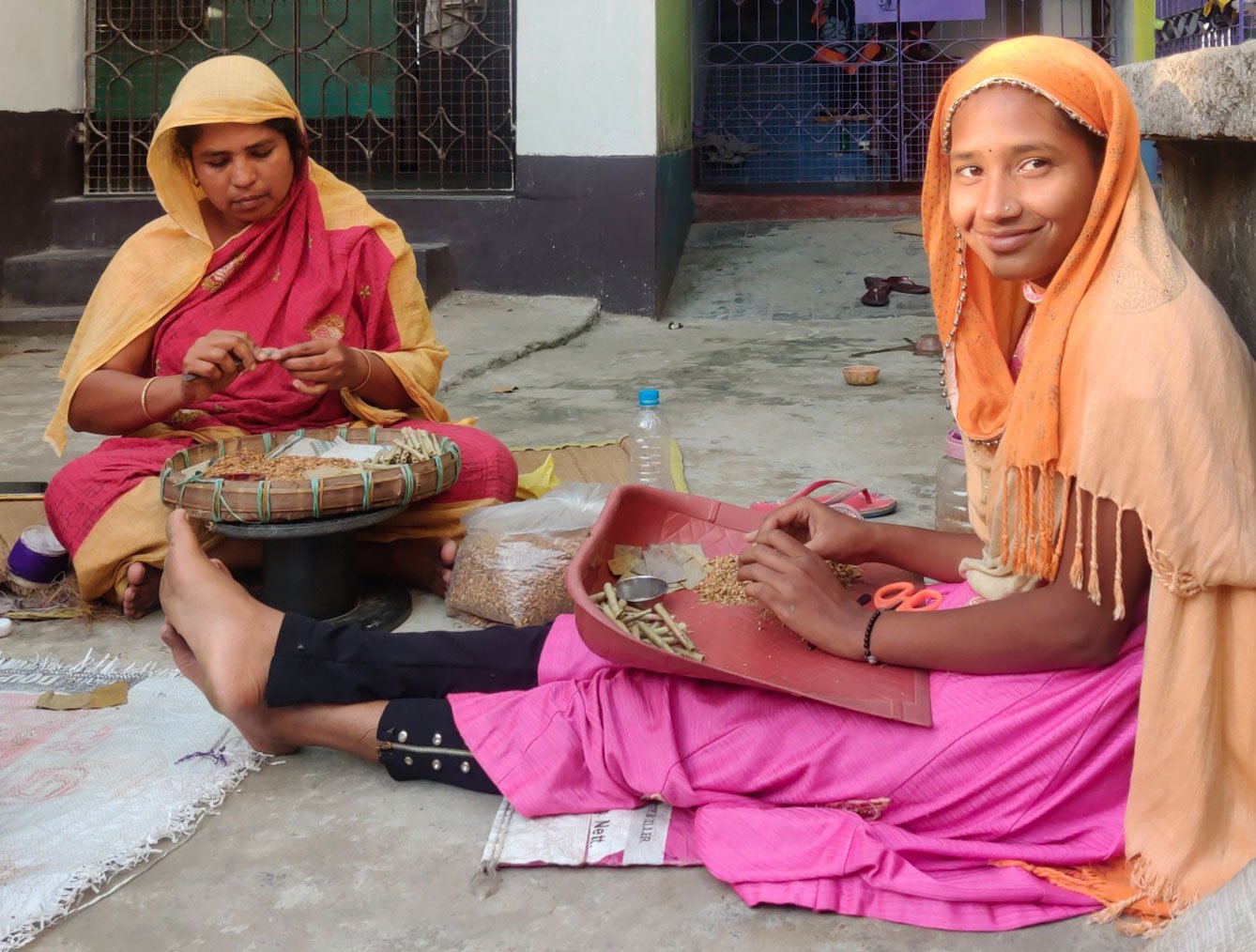
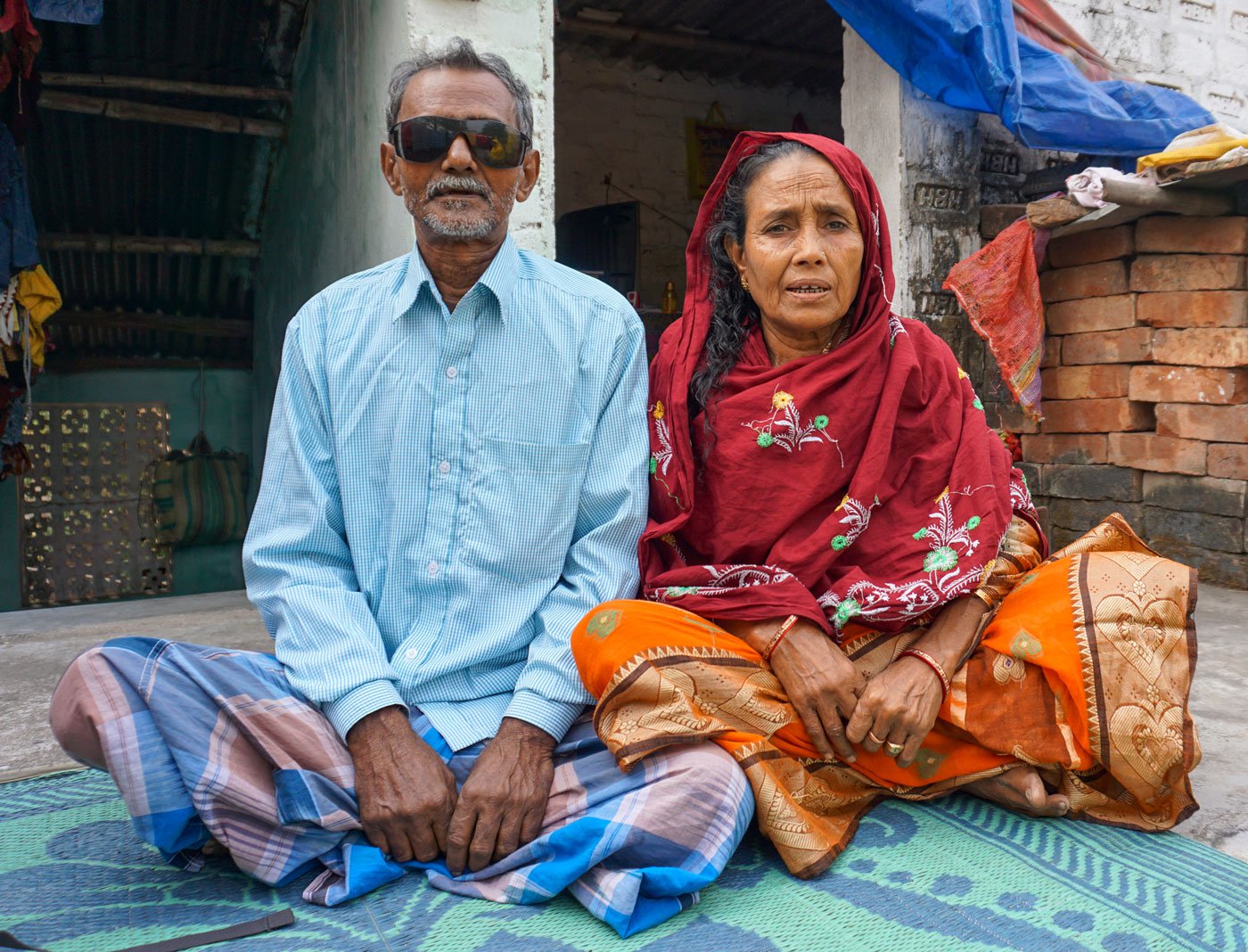
Left: In many parts of Murshidabad district, young girls start rolling to help their mothers. Right: Rahima Bibi and her husband, Ismail Sheikh rolled beedis for many decades before Ismail contracted TB and Rahima's spinal issues made it impossible for them to continue
Anaemia in women aged 15-49 in Murshidabad is an alarming 77.6 per cent, significantly higher than what it was four years ago – 58 per cent. Children of mothers who have anaemia are much more likely to be anaemic. In fact, the recent National Family Health Survey (
NFHS-5
) shows rising anaemia levels for
all
women and children in the district. Also, in this district, 40 per cent of children under the age of 5 are stunted and worryingly, there has been no real change in this figure since the previous NFHS done four years ago in 2015-2016.
A familiar figure in the area, Ahsan Ali is a resident of
Mathpara
mohalla
and runs a small medicine shop there. An unqualified medical practitioner, he is however, a trusted advisor on health issues in the community as he comes from a
beedi
rolling family. The 30-year-old says
beedi
workers routinely come to him for pills and ointments to relieve pain. “By the time they are 25-26, they have a lot of health issues like cramps, muscle weakness, nerve-related pain and severe headaches,” he says.
Young girls are at great risk from their early childhood exposure to tobacco dust in their homes as well as from helping their mothers to fulfil the day’s target. Tanuja started as a young child in Majhpara
mohalla
even before she turned 10. “I would help my mother in folding the ends and tying the
beedis
,” she says and adds, “In our society, they say that ‘girls who don’t know how to roll, won’t get husbands’.”
She was married at age 12 to Rafiqul Islam and went on to give birth to four girls and a boy. According to the NFHS-5, 55 per cent of women in the district are married before the age of 18. Early marriage and childbearing along with a poor nutritional status will have an impact on the next generation, notes
UNICEF
.
“Women’s reproductive and sexual health is intrinsically linked to women’s general health – both physical and mental. You can’t separate one from the other,” warns Hashi Chatterjee, a health supervisor. She is in-charge of Mirzapur panchayat in Beldanga - I block and ensures different health schemes reach the people in need.
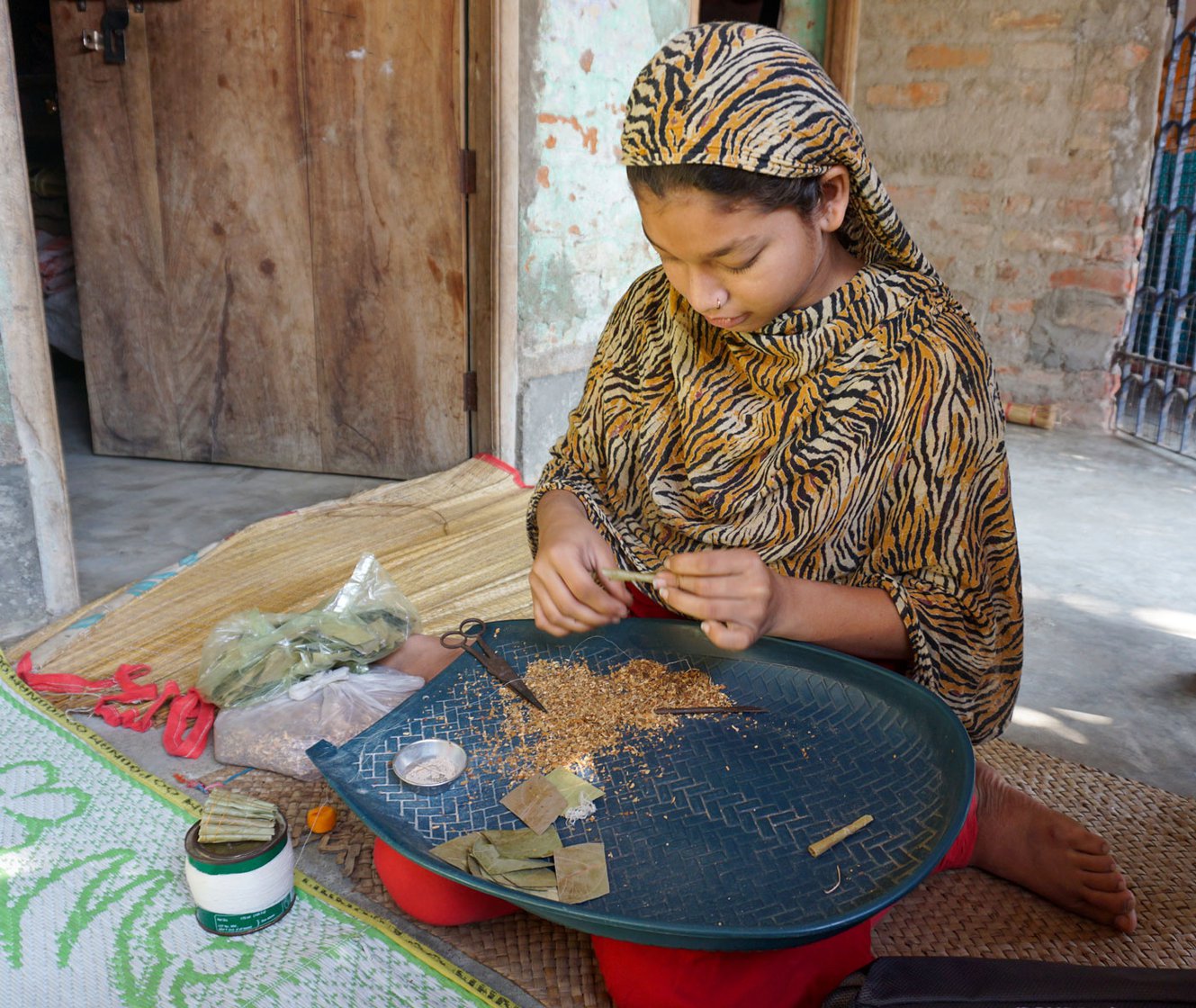
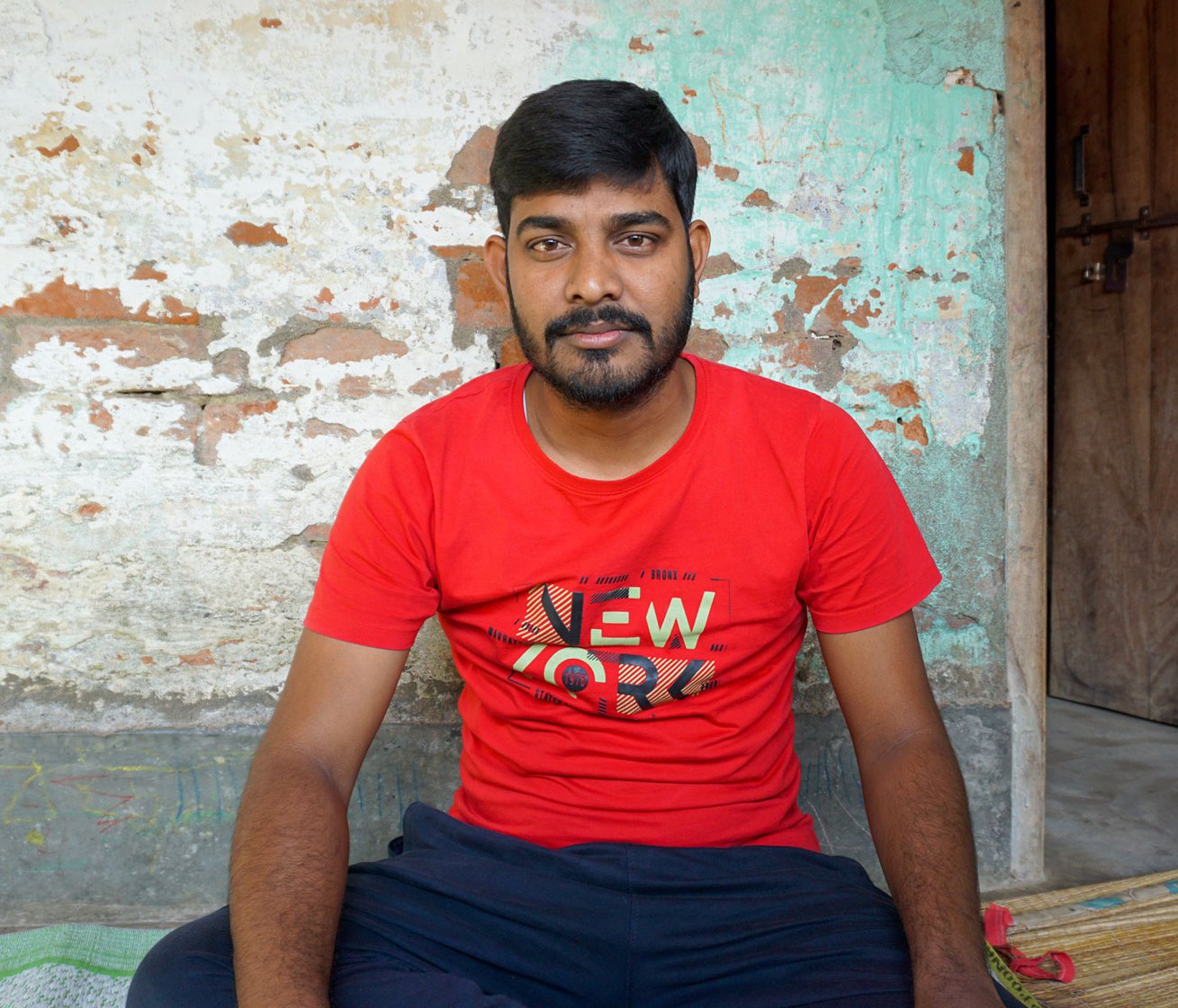
Left: Julekha Khatun is in Class 9 and rolls beedis to support her studies. Right: Ahsan Ali is a trusted medical advisor to women workers in Mathpara
Tanuja’s mother has rolled beedis almost her entire life. Now in her late 60s, the daughter says her mother’s health is so impaired that she can no longer walk properly. “Her back is damaged and she is bedridden,” she says and adds with a sense of helplessness, “This is in store for me as well.”
If the women did not roll beedis they and their families would starve. When Tanuja’s husband became very sick and was not able to go out for work, it was her beedi making skills that helped feed the family of six. She rolled beedis with her new-born baby – her fourth daughter – bundled in a soft kantha quilt on her lap, the family’s dire straits exposing the infant to tobacco dust.
“There was a time when I used to make 1,000-1,200 beedis a day," says Tanuja. Now, in her weakened condition, she manages to roll out only 500-700 a day. That brings in roughly Rs. 3,000 a month and she must maintain that target at great cost to her health.
Murshida Khatun is the headmistress of the Debkunda SARM Girls High Madrasah. She says more than 80 per cent of the girls at her madrasa here in Beldanga - I block come from beedi rolling homes and help their mothers with this work. "Most often the midday meal in school – rice, daal and a vegetable – is the first meal of the day for the young girls. In the absence of males in their homes, usually nothing is cooked in the morning,” she points out.
Murshidabad district is almost entirely rural – 80 per cent of its population live in its 2,166 villages and literacy here is 66 per cent, lower than the state average of 76 per cent (Census 2011). Almost all workers in this industry belong to low income households and have no other skill. Women are preferred workers in this industry as they can work from home and have nimble fingers needed for the job, says a report by the National Commission for Women.
*****
With not a minute to waste, Shahinur Bibi speaks even as she chops onions, chillies and prepares the masala for ghughni . A former beedi worker from the Hareknagar area in Beldanga - I, she has switched to selling this popular snack made of yellow gram from her home in the evening to earn an income.
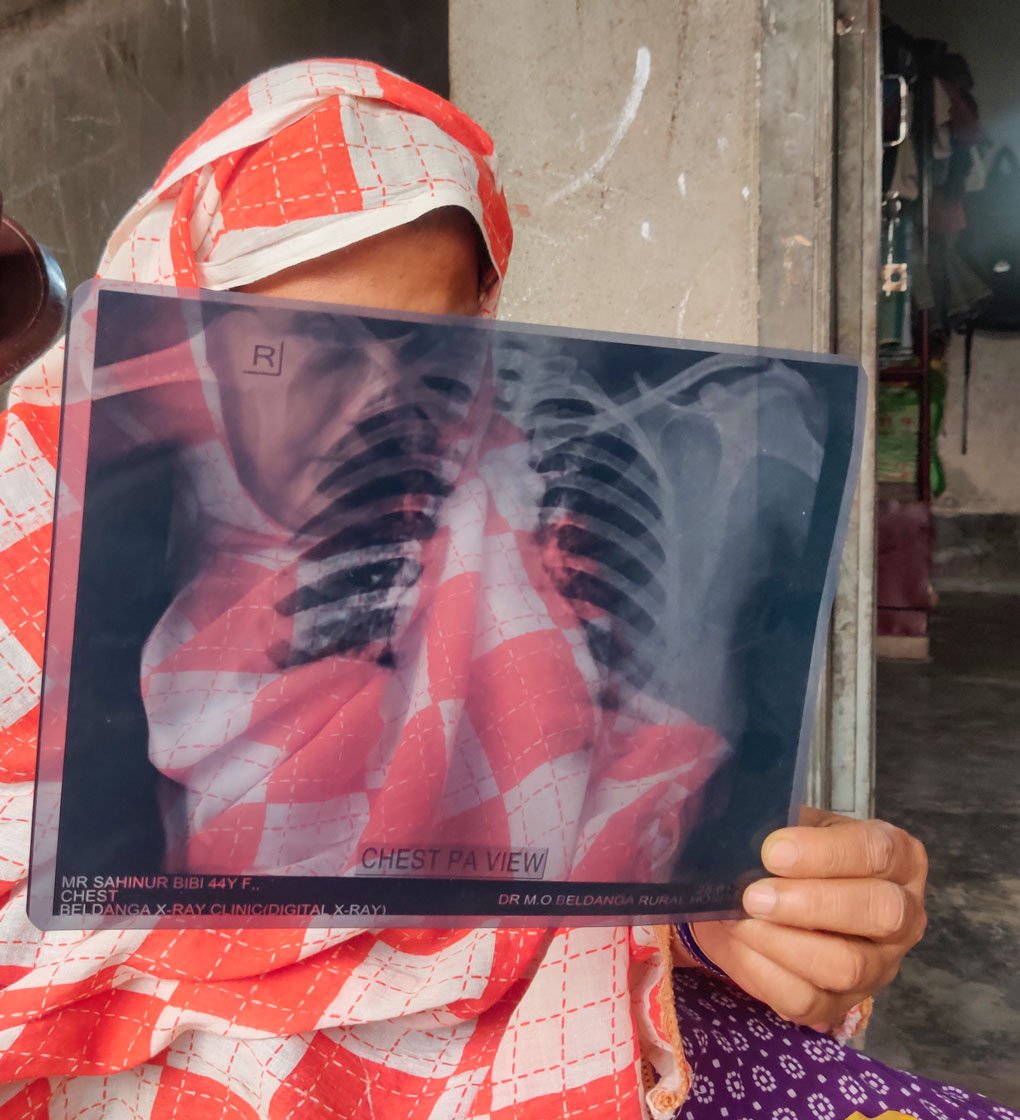
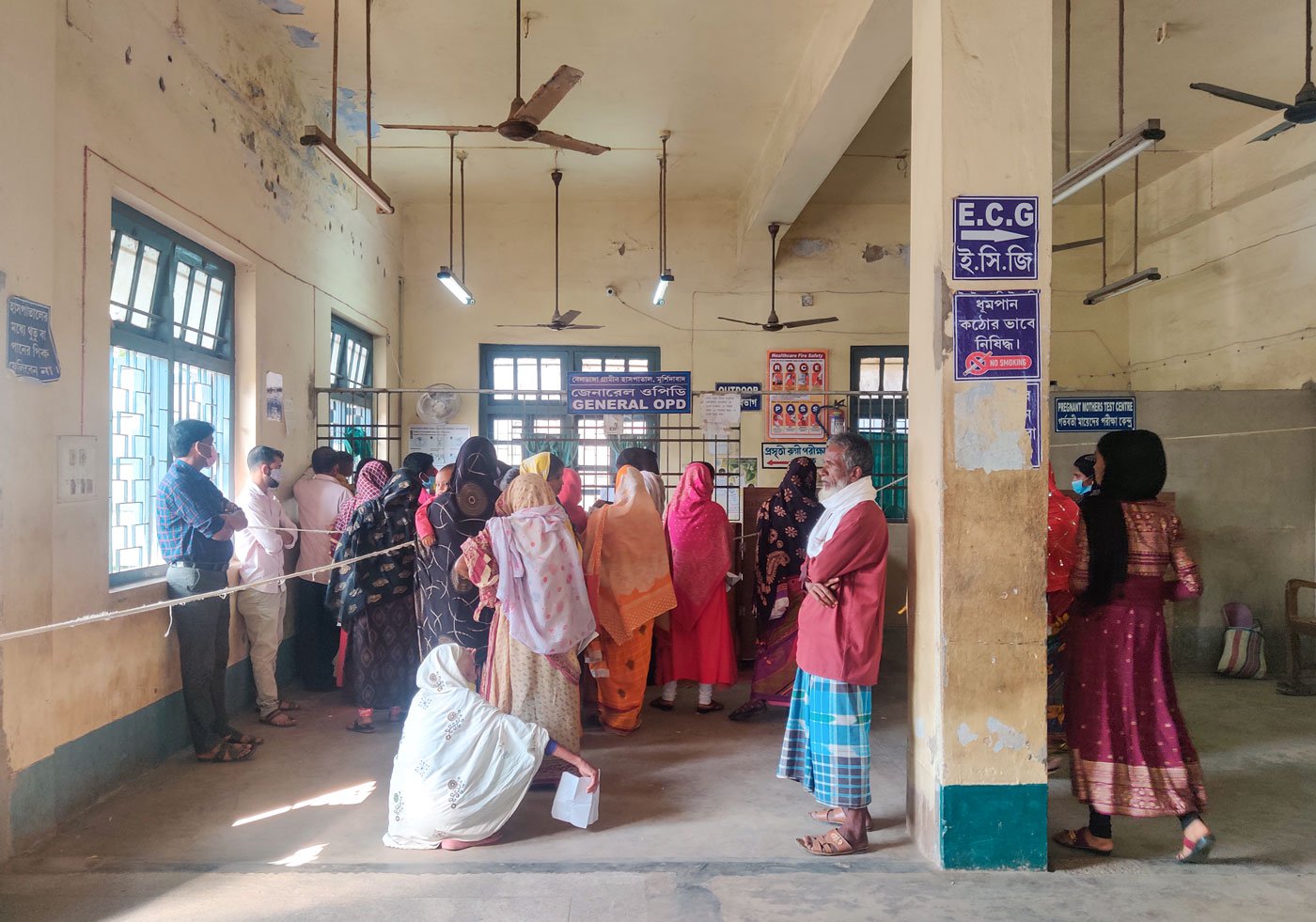
Left: S hahinur Bibi holds up her X-ray showing her lung ailments. Right: At the Beldanga Grameen Hospital's TB unit, people come seeking information and medical advice
“To be sick is the fate of a beedi roller,” says the 45-year-old. A few months ago, struggling with posture and breathing related ailments she went to the Beldanga Grameen Hospital for a check-up and even followed through on getting a chest X-ray at a private clinic. But now she has not been able to return to the hospital as her husband is unwell. “My two daughters-in-law don't let me roll [ beedis ]. They have taken up the work fully but we can barely survive on that [earning],” she says, explaining why she is selling ghughni .
Dr. Solman Mondal has observed a regular flow of 20-25 confirmed TB patients every month at the block hospital where he works. “
Beedi
rollers are at high risk of contracting tuberculosis due to continuous exposure to the toxic dust. This leads to very frequent colds and a gradual weakening of the lungs,” says Mondal, the Block Medical Officer (BMO) of Beldanga - I.
Down the road from here in Darjipara
mohalla
, Saira Bewa deals with persistent coughs and colds. This is aside from blood sugar and blood pressure related problems the worker in her 60s has had for the last 15 years. After rolling
beedis
for almost five decades, her hands and nails are smeared with tobacco dust.
“The mosla [finely crushed tobacco] is a common allergen and particles are inhaled during rolling as also tobacco fumes,” points out Mondal. A hazard of the job that reflects in the fact that in West Bengal the number of women with asthma is twice that of men – 4,386 women per 1,00,000 (NFHS-5).
The BMO also points out that, "despite the strong correlation between the exposure to tobacco dust and TB, we don’t have occupation specific screening for TB.” This lacuna is especially glaring in a district which has the highest concentration of
beedi
workers. Saira has been coughing up blood – a precursor to contracting tuberculosis. “I went to the Beldanga Grameen Hospital. They did some tests and gave me a few tablets,” she says. They also advised her to get her sputum tested and stay away from tobacco dust. But no protective accessories were provided.
In fact, none of the beedi workers that PARI met in the district either owned or used masks or gloves. They also had no employment related documentation and were not cushioned by any social security benefits or welfare and healthcare schemes. There was also a complete absence of standardised wages. Beedi companies outsource the work to mahajans (middlemen) and wash their hands off any responsibilities and liabilities. The mahajans in turn buy the beedis but pay no heed to any of this.
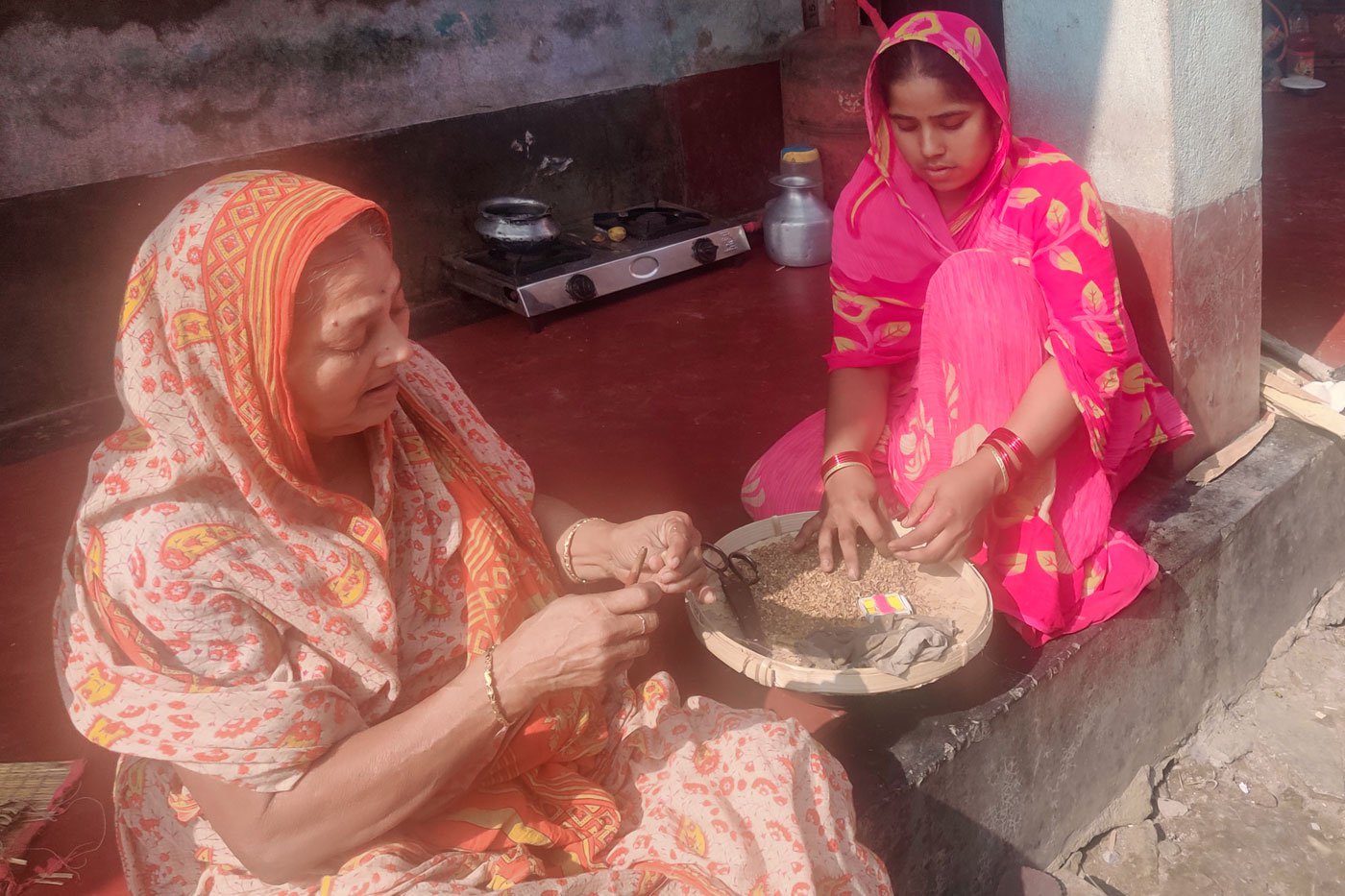
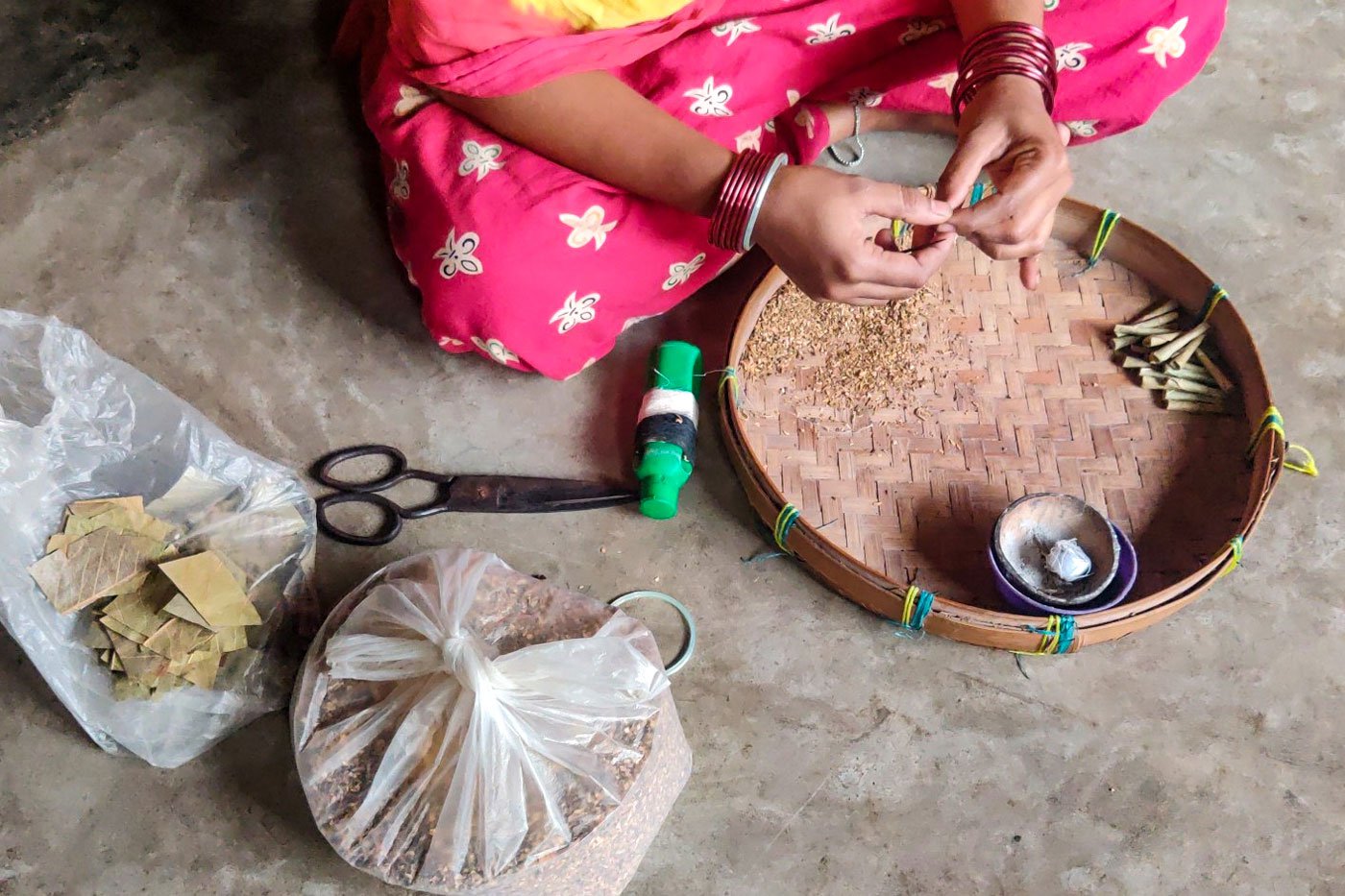
Saira Bewa and her daughter-in-law Rehana Bibi (in pink) rolling beedis . After five decades spent rolling, Saira suffers from many occupation-related health issues
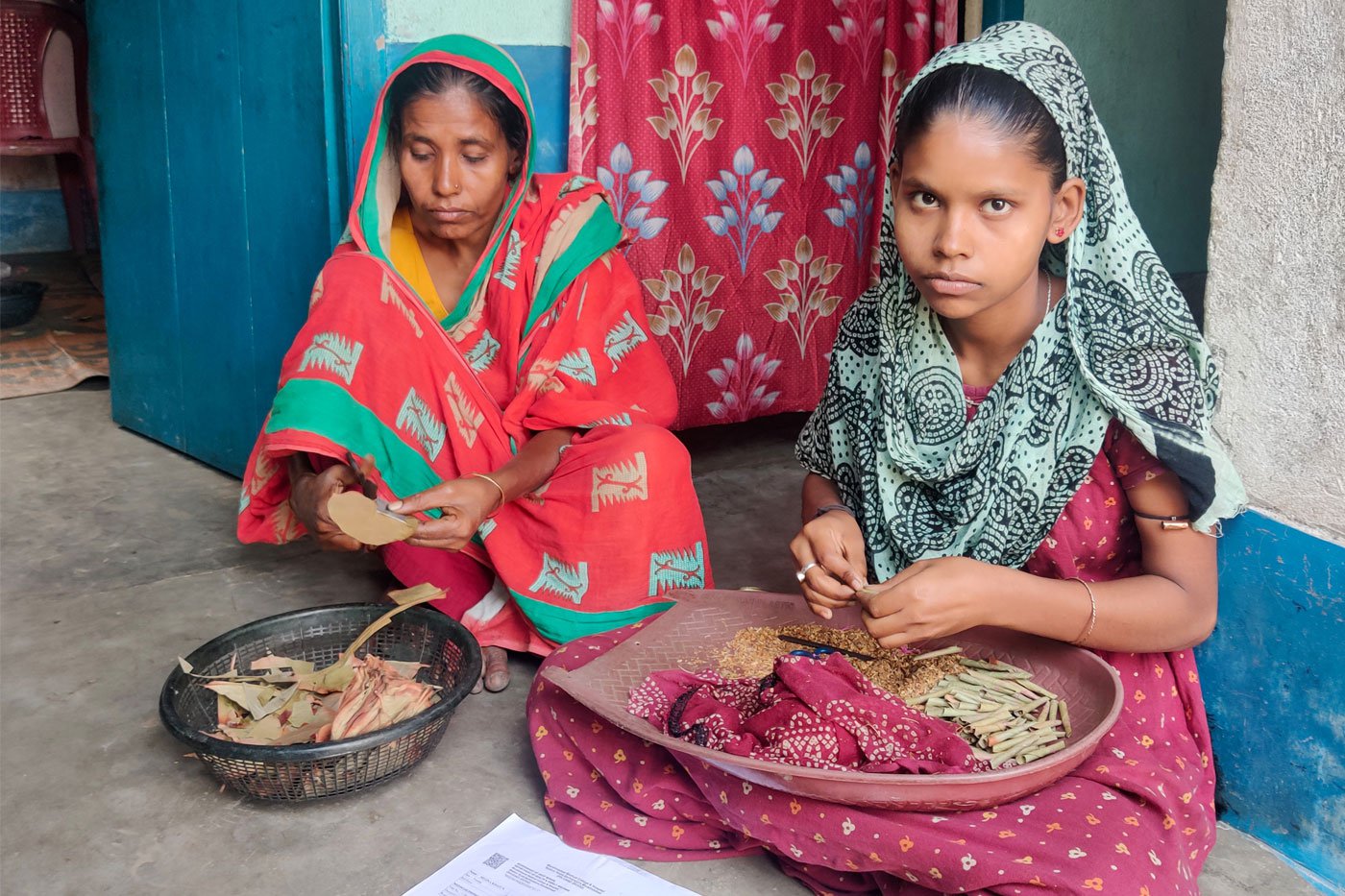
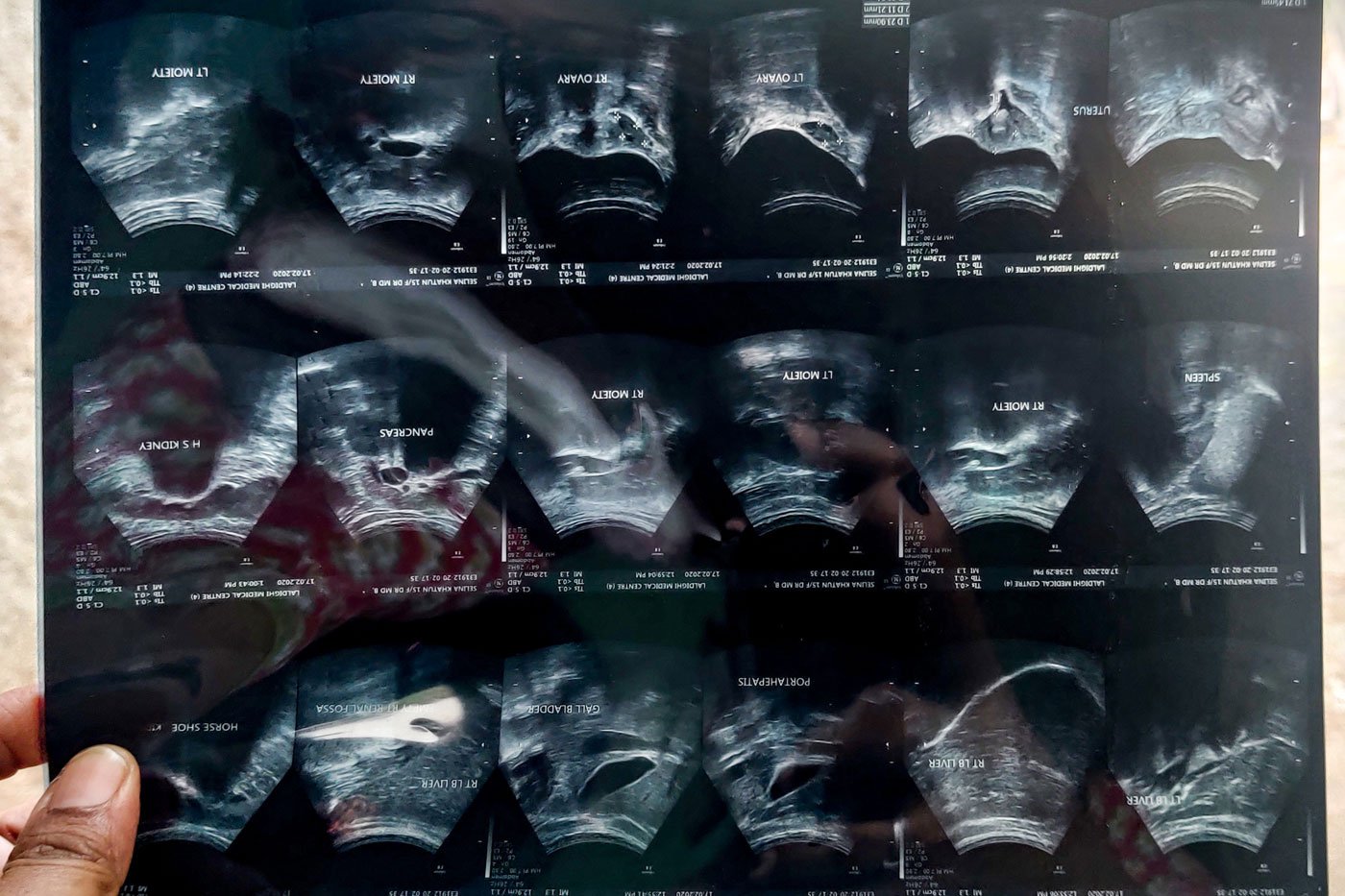
Selina Khatun with her mother Tanjila Bibi rolling beedis in their home in Darjipara. Tanjila's husband abandoned the family; her son is a migrant labourer in Odisha. The 18-year-old Selina had to drop out of school during lockdown because of kidney complications. She is holding up the scans (right)
Almost two-thirds of Murshidabad’s population is Muslim and almost all
beedi
workers are Muslim women. Rafiqul Hassan has been working with
beedi
workers for more than three decades. “The
beedi
industry has always thrived on the exploitation of the cheapest labour force, largely made of Adivasi and Muslim girls and women,” says the block secretary at the Centre for Indian Trade Unions (CITU) here in Beldanga.
The WB labour department admits on record that beedi workers are among the most vulnerable workers in the informal sector. The department’s stipulated minimum wage of Rs. 267.44 is not enjoyed by beedi workers who earn Rs. 150 per 1,000 beedis . That is even less than the national minimum wage of Rs. 178 set by the Code on Wages , 2019.
“Everyone knows women get so much less than men for the same work,” points out Saida Bewa who works with the CITU affiliated Murshidabad District Beedi Mazdur and Packers Union. Bewa says that mahajans [middlemen] also supply them with poor quality raw material and during final checks reject some products. “The mahajans keep the rejected beedis but don’t pay for them,” she said pointing out the unfairness. "They threaten us saying ‘you don’t like it then don’t work with us’,” adds the 55-year-old who wants the state to have specific schemes for beedi workers.
With marginal wages and no safety net, daily wage workers like Tanuja live financially precarious lives. The couple have a Rs. 35,000 loan to repay for their third daughter’s marriage. “Our lives are stuck in a cycle of debt and repayment,” she says referring to the multiple loans she has had to take for each wedding and later, work towards repaying.
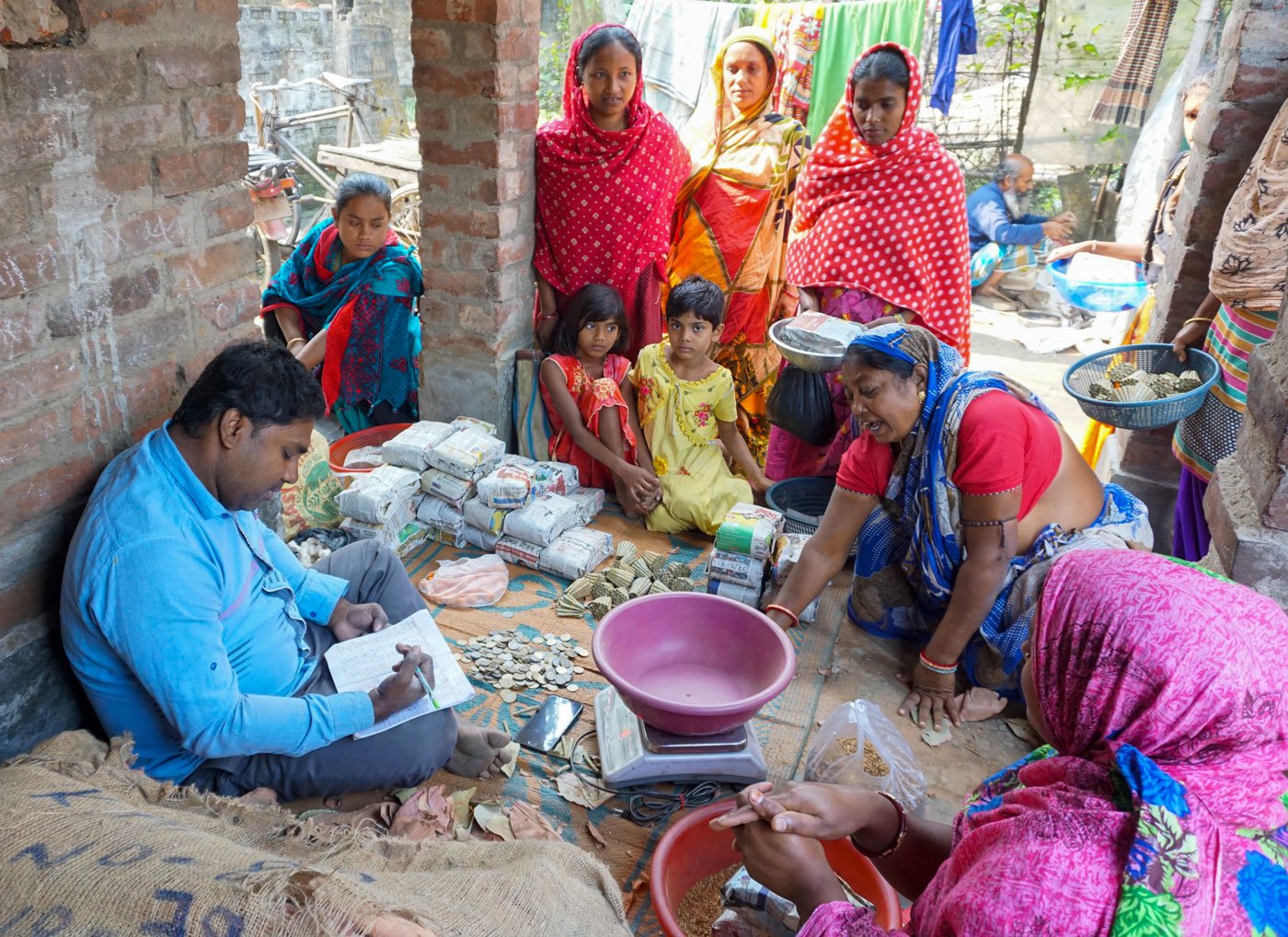
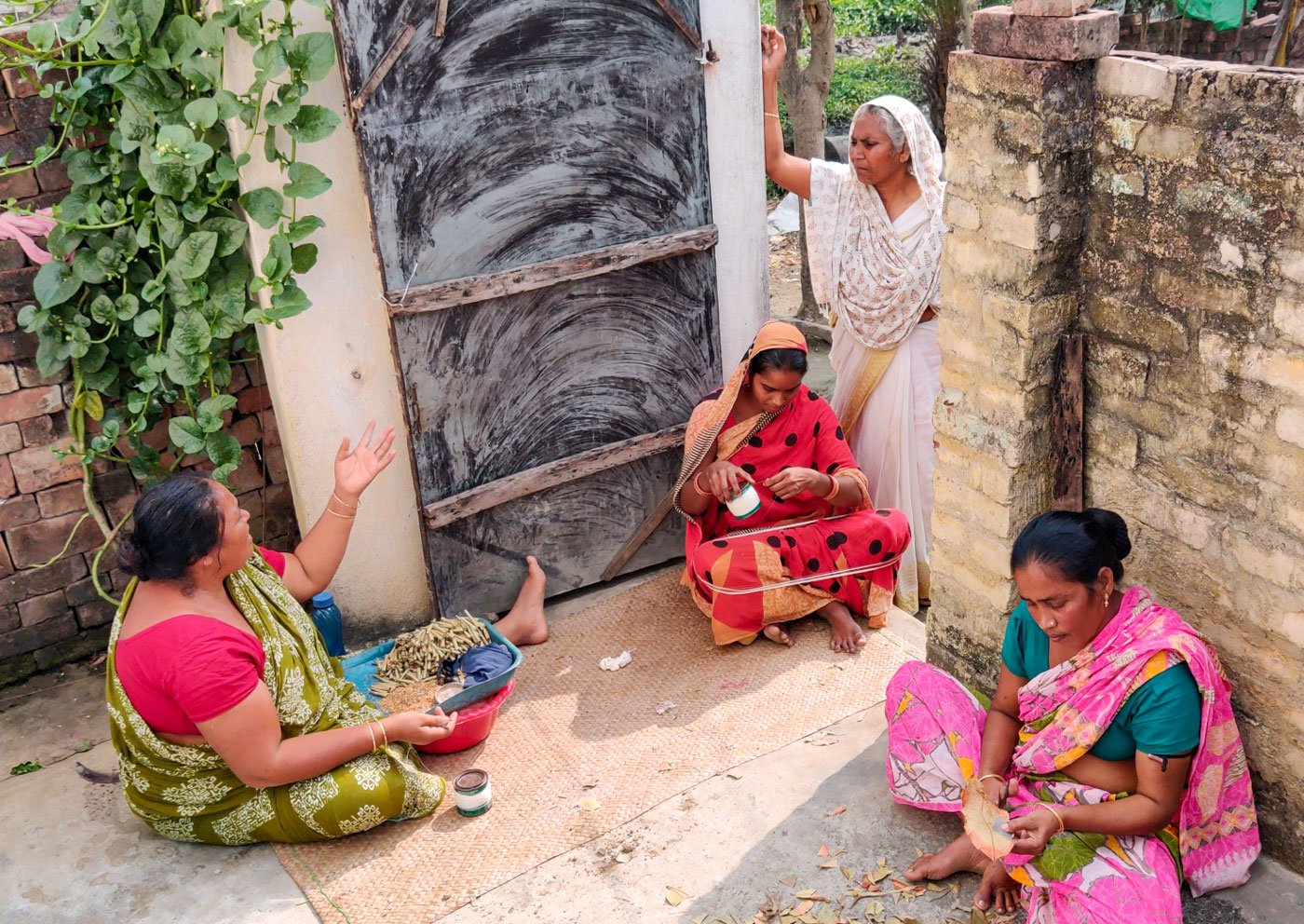
Left: A mahajan settling accounts in Tanuja Bibi’s yard; Tanuja (in a yellow saree) waits in the queue. Right: Saida Bewa at the door of the home of beedi workers in Majhpara mohalla, Beldanga where she is speaking to them about their health
As a young couple, Tanuja and Rafiqul lived with his parents When the children came along, the couple borrowed money, bought land and built a one-roomed thatched home. “Both of us were young then and we thought with our hard work we would repay that loan. But that never happened. We kept on borrowing for one thing after the other and here we are now, still unable to complete this home.” Although eligible for a home under PM Awas Yojana, the landless couple are yet to receive one.
Rafiqul now works as a sanitation worker under contract with the gram panchayat for its dengue eradication programme. His monthly earnings of Rs. 5,000 don’t always arrive on time: “The irregularity creates a lot of stress for me. There was a time when he did not receive a paisa for six months,” she says and the family ran up a credit bill of Rs. 15,000 at the local shop.
Beedi workers take no maternity or sick leave; both pregnancy and childbirth are managed as they continue rolling. Programmes like Janani Suraksha Yojana, Integrated Child Development Scheme (ICDS) and free midday meals have helped younger women. “But the toll on elderly women workers' health has not been calculated,” points out USHA worker Sabina Yasmin. “Their health worsens after reaching menopause. Calcium and iron – two of the most important things for women are severely lacking and they have poor bone health and anaemia,” she adds. In-charge of one of 14 wards in Beldanga town’s municipality, Yasmin regrets that she can do little as her role and duties are mostly restricted to maternity and child care.
Abandoned by both the industry and the state, women beedi workers have little to look forward to. In fact, Tanuja became agitated when asked about any working benefits. “No babu [contractor] ever comes to enquire about us," she says.
"The block development office [BDO] said that doctors will come to examine us. They gave us big useless tablets that did nothing,” she recalls. No one came to check on the women and Tanuja doubts those tablets were meant for humans: “I think those were for cows.”
PARI and CounterMedia Trust's nationwide reporting project on adolescent girls and young women in rural India is part of a Population Foundation of India-supported initiative to explore the situation of these vital yet marginalised groups, through the voices and lived experience of ordinary people.
Want to republish this article? Please write to
[email protected]
with a cc to
[email protected]
